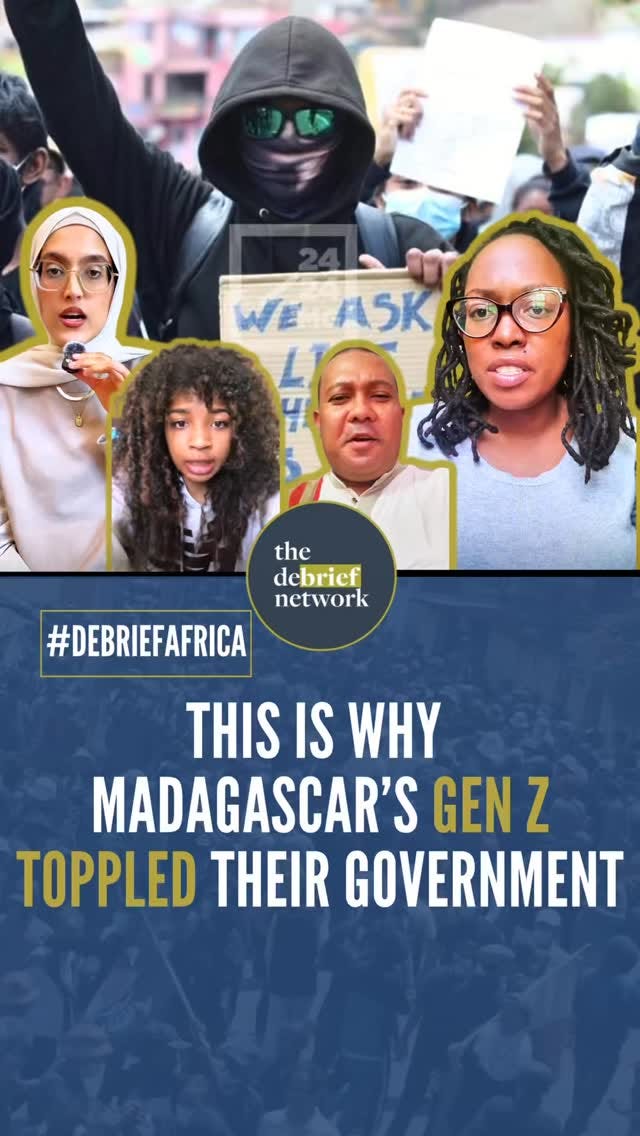There’s a lot happening in Madagascar right now, and it matters far beyond the island’s borders.
I’ve been watching this closely since 25 September, when a group of young people, mostly students in their teens and early twenties, began taking to the streets.
It quickly started being called the Gen Z protests – youth born between 1997 and 2012 – because of the age of the protesters but also because of the global developments in Nepal, the Philippines, Kenya and Bangladesh, where leaderless youth took to the streets demanding change.
It was big in Antananarivo, but it quickly spread across the island nation because it was a palpable exhaustion with the indignity of persistent water and electricity cuts.
Two weeks and a bit later, what would have been classified as a service delivery crisis has now been termed an unconstitutional effort to grab power.
The implications are significant for the Malagasy people but also for the rest of the continent.
Three things stand out about these protests: they were led by the young, they were leaderless, and they were organised almost entirely online. In a country where poverty and isolation are normalised, it was TikTok and Telegram that built a movement.
So, were the protests justified?
I spoke to a civil servant, Rakotozafy Longin Arcesilas, who summed up the reality of life in Madagascar. “Electricity is a luxury here,” he told me. Think about that, not a convenience, a luxury.
If the absence of electricity and water is a daily fact of life, what made this moment different? Indignity.
The breaking point came not from a single event but from the realisation that the system had stopped even pretending to care.
“They did nothing about it,” Arcesilas said to me.
Now, where are we?
The slogans have changed from being service delivery-focused, “We want to live, not survive,” to a call for a complete overhaul of the state.
Soldiers began joining the protests, prompting talk of a coup attempt. For context, Madagascar’s president, Andry Rajoelina, came to power through a coup in 2009, and he has remained in charge ever since in one form or another.
Now, as irony would have it, he’s facing the same challenge he once used to rise.
Both the African Union and SADC (which Madagascar currently chairs) expressed concern over the weekend. AU Commission Chair Mahmoud Ali Youssouf reaffirmed the AU’s “firm rejection of any unconstitutional change of government” and urged all actors – civil, military and political – to show restraint and return to dialogue.
But the situation quickly turned volatile. Rajoelina went into hiding, and French media reported that he had fled the country to France, where he has held full citizenship since 2014.
That is a serious conversation for another day. How do SADC citizens head the regional bloc, and how does the AU allow for it?
(If you are as mind-blown as I am, read this piece in the Daily Maverick: We have a European citizen as head of SADC and no one seems to care).
Many Malagasy already accused Rajoelina of serving French interests over national ones, and the idea that their president could retreat to his “other” country during a national crisis only deepened the fury.
When he finally appeared on national television on Monday night, after delaying his address twice, there was widespread expectation that he might resign.
Instead, he doubled down. Rajoelina promised reforms and improvements to service delivery, which didn’t appease protesters.
By Tuesday, he dissolved the National Assembly, pre-empting an opposition-led impeachment vote.
So where does this leave Madagascar?
In conversation with Arcesilas again, I asked if he felt hopeful. “Yes,” he said, “but this feels like 2009 all over again. Maybe this time we can do it better.”
That line stayed with me.
You could dismiss it as a lower struggle for power in an island nation of 31 million people. But whether leaders like it or not, it has a contagious effect.
And leaders are completely out of bounds when it comes to dealing with a generation, often a huge part of the population, that is not only rejecting them but rejecting a political class altogether.














